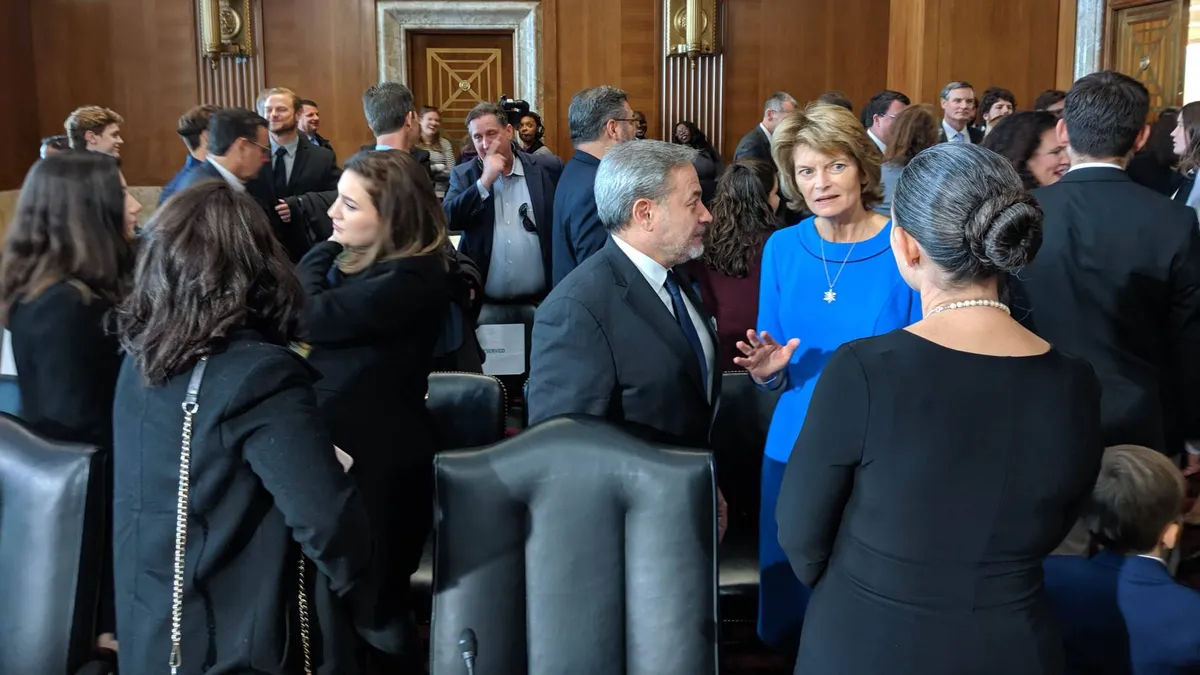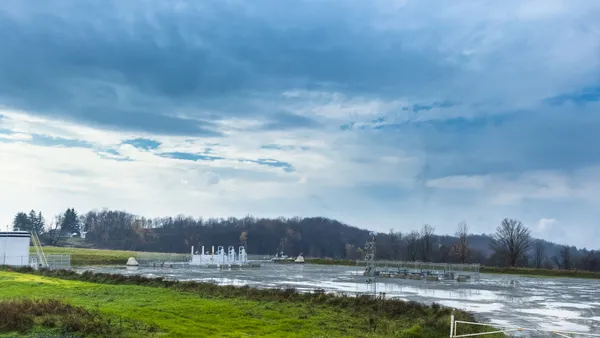Dive Brief:
-
Sen. Lisa Murkowski, R-Alaska, is holding out hope that the comprehensive clean energy bill she sponsored will pass the Senate this year, despite a potentially more difficult path following the death of Supreme Court Justice Ruth Bader Ginsburg on Friday.
-
"Our challenge now is to bring our innovation package back to the Senate floor. We think that we can finish debate in just a few hours, at most, if we're just given the chance," she said during a National Clean Energy Week symposium Tuesday. "We recognize that that will require cooperation from members on both sides of the aisle, which is a lot to ask, especially right before an election. But I'm sure not giving up."
-
Policy watchers and other members of Congress say the fight over whether to fill Ginsburg's seat may take up much of what little time is left in the fiscal year. The justice's death "added the October surprise in September," said Sen. Mike Braun, R-Ind., during the symposium.
Dive Insight:
Murkowski will wrap up her 12 years of leadership on the Senate Committee on Energy and Natural Resources (ENR) at the end of this year, having spent six years as ranking member and another six as chair, and implored clean energy interests not to give up hope on seeing a clean energy package pass before her term as chair is up.
"Some are already looking ahead to next year, past the elections and to a new Congress, as they contemplate what is possible on clean energy, and I understand that impulse," she said. "But I would also encourage you not to give up hope on meaningful legislation before the end of this year."
She and ENR Ranking Member Joe Manchin, D-W. Va., in February introduced a wide-ranging legislative package that incorporates almost 50 bills reported to the Senate in 2019. It includes 17 demonstration projects for advanced nuclear, carbon capture, long duration storage and geothermal, and would be the first comprehensive federal energy bill to pass since 2007.
The bill hit a roadblock in March, ultimately preventing the Senate from bringing it to the floor for a vote. An amendment to limit the use of hydrofluorocarbons (HFCs) — a potent greenhouse gas used in air conditioner units, refrigeration, building insulation and other applications — led to the stall, but senators came to an agreement on including the amendment earlier this month.
The inclusion of the HFC phasedown "clears one significant hurdle" and ultimately "makes it an even better bill," Murkowski said Tuesday.
But Senate Majority Leader Mitch McConnell's resolution to nominate a new Supreme Court Justice to Ginsburg's now-vacant seat before the election could tighten the timeline, say stakeholders. Murkowski is one of two senators to oppose filling the vacant seat before the November elections. And the White House has been clear in its opposition to the HFC phasedown.
On Monday the White House's Office of Management and Budget (OMB) indicated the president would veto the House's companion bill, set for a vote this week, in part because of the HFC provision.
Both the House and Senate version of the bill would reduce HFC use 85% over the next 15 years.
"This legislation would bypass well-established processes and procedures and would impose substantial, unwarranted costs on Federal, State, and local agencies and other key stakeholders in both public and private sectors," the OMB said in a statement. "It would do so by setting rigid energy savings and water consumption reduction targets for Federal agencies, requiring State and local governments to establish strict building codes that are not grounded in available technologies, and mandating a rigorous transition from hydrofluorocarbon use in the private heating and cooling sector."
Despite the looming Senate fight and White House opposition to the House's HFC phaseout, among other provisions, some policy observers say there is still room for negotiations, and time to make the package law.
"There is still time for the House and Senate to agree on a compromise energy bill closer to the full Senate Innovation Act, which I believe the White House will ultimately support," said Sasha Mackler, director of the Bipartisan Policy Center's energy project, in an email.















